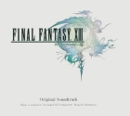
|
|
Neurovision :: Review by Don
 |
Album Title: | Neurovision |
| Record Label: | Square Enix | |
| Catalog No.: | iTunes | |
| Release Date: | March 18, 2009 | |
| Purchase: | Buy at iTunes |
Overview
Mitsuto Suzuki is currently a synthesizer operator for Square Enix who has worked on games such as Sigma Harmonics, Chocobo's Mysterious Dungeon: Labyrinth of Forgotten Time, and the upcoming Final Fantasy XIII. However, before joining the company he also had experience as an electronica artist, heading techno-pop unit Overrock, remixing the music of Erik Satie, and producing some Bemani compositions. After the strong reception to his contributions on the Square Enix Bootleg series and the solo album In My Own Backyard, Suzuki released his second solo album in 2009, Neurovision, through iTunes. It features all new compositions, unlike his first album which featured pieces from the Square Enix Bootleg series of albums. Is Suzuki's second solo album even better than the first?
Body
Like Suzuki's first album, this album features a mix of vocal and instrumental pieces. While this album does contain more vocal pieces, I find that they are, for the most part, much better than those found on In My Own Backyard. The crowning achievement in the vocal department, at least in my opinion, is the title track, "Neurovision". The verse features a mixture of interesting electronic rhythms — with some of the beats sounding out of synch — and an extremely catchy vocal line, it manages to keep my brain engaged. However, the chorus is even catchier! The spacey sounds of someone saying "Neurovision" alongside the instrumentals is almost hypnotic. I don't know how many times during the day I have to stop myself from just singing the chorus!
Vocals are also used in less prominent ways in a few other tracks. "Dream Real" is an energetic electronica piece, which carries a nice steady beat that varies over time. The vocals help add some nice contrast to the piece, but I don't find that they add anything particularly special to the piece. The instrumental sections also add some interesting synth lines as well and make the piece much more engaging. "Recall" reminds me a bit of Daft Punk. This piece may be hit or miss for some, but I find the beat and backing instrumentals to be absolutely enticing. The vocoder vocals tend to repeat the same things, almost ad nauseum, but having been so used to some of Daft Punk's songs, I really didn't mind. It adds a nice rhythm to the piece, nonetheless!
On the instrumental side of things, there are some duds as well as some clear winners. Unfortunately, one of my favorite pieces from the first album, "Clear," was remixed for this album and I wasn't impressed in the least. Entitled "Clear (Free Style Ambience Dub)," the arrangement is one of most boring themes on there. It definitely has the ambience down, but I found that, for the most part, what made the original so worthwhile to be butchered here. Not only does it meander for what seems like ages, but when the more prominent sections appear, they don't really last for too long.
However, not all is lost. There are some really good themes as well, such as "Seasons of Change". Unlike most of the instrumental themes from the first album, this piece has a much faster pace than most. The combination of synth lines and an engaging beat help make for a really entertaining listen. My favorite instrumental theme, however, also ends the album. "The Sheep That Lived a Million Times" is a calm, soothing, almost ethereal electronica piece that features a beautiful piano line that sporadically enters to help add a nice touch to the overall atmosphere. In many ways, this piece feels almost as if it were inspired by Hamauzu himself, when he engages in softer electronica pieces such as "Besaid Island" from Final Fantasy X. Either way, it's a beautiful way to end the album.
Summary
In the end, I found Neurovision to be better than Suzuki's first album, In My Own Backyard. The vocals, for the most part, were less irritating than the former and the instrumentals were a lot stronger. The most unfortunate thing about the entire album though is the butchering that "Clear" received. I'm not sure what he was thinking there, but fortunately, most of the album didn't take on that approach. This one is worth picking up as well if you are into this softer style of electronica.

